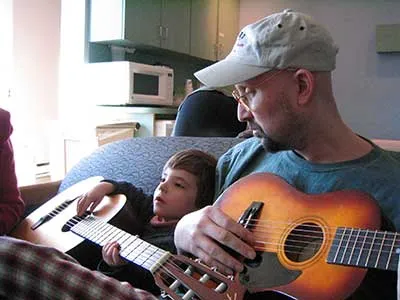Out of Options

Editor's Note: This is part of Nancy's Caregiving series. Please see other posts in this series.
By November 2003, Brett and I were hanging on by a thread. Six years into our cancer journey, we felt the effects of cancer on our marriage. I snapped at my husband for the things he did and the things he did not do, like putting his socks in the hamper. It was easier to vent at him than confront his growing weariness. For the first time since he was diagnosed with medulloblastoma, he looked and acted defeated by his cancer.
It was merciful that Brett was able to continue going to work. It did wonders for his psyche; it made him feel husbandly and fatherly. But he would collapse from exhaustion the moment he got home.
I, too, was exhausted and strung out from juggling multiple roles--caregiver, wife and parent.
The toll of cancer weighed even on our 18-month-old twins. When Rebecca wasn’t clinging to me for dear life, she plucked strands of fine hair from her head and tried to eat them to soothe herself. Casey, meanwhile, crouched outside our bedroom door, waiting for Brett to wake up. Both of them sensed intuitively that something was very wrong.
Since the twins had been born premature, they received intervention services, including play therapy. A kind social worker named Jill came to the apartment each week and drew simple sketches of our family.
Here is Casey waiting for Daddy to get up. Here is Daddy sleeping because he doesn’t feel well. Here is Daddy waiting for us to pick him up in the car.
Looking at these real-time drawings allowed the twins to understand that daddy was sick—not the same sick as having a cold.
In a moment of eerie foreshadowing, Casey put his stubby fingers on my face and said, “Mama’s all alone.”
Nearing the end
One night while lying in bed, Brett suddenly started talking gibberish. Everything had been fine the minute before and then I couldn’t make out a word he was saying. By the time we got to the hospital, Brett was talking normally again. But an MRI confirmed the cancer had spread to his brain and spine. The news was grim. All available treatment options had run out. Brett's oncologist arranged for home hospice.
Knowing that there was nothing else left to try actually lessened my anxiety; we’d left no stone unturned. But to be honest, I didn't have any more emotional reserve for false hope when it was so obvious that Brett’s health was failing. Some days Brett picked up his briefcase and announced that he was going to work while falling against the walls of our hallway. The grand mal seizure that landed him in the hospital and subsequent mini-seizures altered both his cognitive function and his balance.
Every day brought new struggles depending upon his mental and physical state.
For all my ability to lead and manage on my own, I could not have survived this time without leaning on the support of experts, hospice, family, and friends. I said yes to friends going grocery shopping for me or to taking the twins to the park. I said yes to all forms of help because I needed quiet calm with Brett. I minimized the tasks of life to maximize my connection with him. The days, hours and minutes mattered.
Suggested Resources:
Caregivers
www.CancerSupportCommunity.org/caregivers
10 Tips for Caregivers
www.CancerSupportCommunity.org/living-cancer/living-cancer-topics/caregivers/ten-tips-caregivers
Coping with Brain Tumors
www.cancersupportcommunity.org/coping-brain-tumor
Friends & Family
www.CancerSupportCommunity.org/family-and-friends
Fatigue
www.CancerSupportCommunity.org/fatigue
Talking to Kids and Teens about Cancer
www.CancerSupportCommunity.org/talking-kids-teens-about-cancer
Bereavement
www.CancerSupportCommunity.org/bereavement
Find Support
www.CancerSupportCommunity.org/find-support
Find a local CSC or Gilda's Club for support groups and other resources
www.CancerSupportCommunity.org/FindLocation